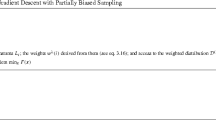Abstract
Econometric theory describes estimators and their properties, e.g., the convergence of maximum likelihood estimators. However, it is ignored that often the estimators cannot be computed using standard tools, e.g., due to multiple local optima. Then, optimization heuristics might be helpful. The additional random component of heuristics might be analyzed together with the econometric model. A formal framework is proposed for the analysis of the joint convergence of estimator and stochastic optimization algorithm. In an application to a GARCH model, actual rates of convergence are estimated by simulation. The overall quality of the estimates improves compared to conventional approaches.
Similar content being viewed by others
References
Bollerslev T, Ghysels E (1996) Periodic autoregressive conditional heteroscedasticity. J Bus Econ Stat 14(2): 139–151
Bond D, Harrison MJ, O’Brien EJ (2005) Investigating nonlinearity: a note on the estimation of Hamilton’s random field regression model. Studies in Nonlinear Dynamics and Econometrics, Article 2
Brooks C, Burke SP, Persand G (2001) Benchmark and the accuracy of GARCH model estimation. Int J Forecast 17: 45–56
Clements MP, Krolzig H-M (1998) A comparison of the forecast performance of Markov-switching and threshold autoregressive models. Econom J 1: C47–C75
Dorsey B, Mayer WJ (1995) Genetic algorithms for estimation problems with multiple optima, nondifferentiability and other irregular features. J Bus Econ Stat 13: 53–66
Dueck G, Scheuer T (1990) Threshold accepting: a general purpose algorithm appearing superior to simulated annealing. J Comput Phys 90: 161–175
Fang K-T, Maringer D, Tang Y, Winker P (2005) Lower bounds and stochastic optimization algorithms for uniform designs with three or four levels. Math Comput 75(254): 859–878
Fiorentini G, Calzolari G, Panattoni L (1996) Analytic derivatives and the computation of GARCH estimates. J Appl Econom 11(4): 399–417
Fitzenberger B (1997) A guide to censored quantile regressions. In: Maddala GS, Rao CR (eds) Handbook of statistics, vol 15: Robust inference. Elsevier, Amsterdam, pp 405–437
Fitzenberger B, Winker P (2007) Improving the computation of censored quantile regressions. Comput Stat Data Anal 52(1): 88–108
Hamilton JD (2001) A parametric approach to flexible nonlinear inference. Econometrica 69(3): 537–573
Hamilton JD (2005) Comment on investigating nonlinearity. Studies in Nonlinear Dynamics and Econometrics, Article 3
Herwartz H (2004) Conditional heteroskedasticity. In: Lütkepohl H, Krätzig M (eds) Applied time series econometrics. Cambridge University Press, Cambridge, pp 197–221
Ho MS, Sørensen BE (1996) Finding cointegration rank in high dimensional systems using the Johansen test: an illustration using data based Monte Carlo simulations. Rev Econ Stat 78(4): 726–732
Maringer D (2005) Portfolio management with heuristic optimization. Springer, Berlin
Maringer D, Meyer M (2008) Smooth transition autoregressive models—new approaches to the model selection problem. Studies in Nonlinear Dynamics and Econometrics 12(1), Article 5 (2008)
McCullough B, Renfro CG (1999) Benchmarks and software standards: a case study for GARCH procedures. Comput Econ Social Meas 25: 59–71
McCullough BD, Vinod HD (1999) The numerical reliability of econometric software. J Econ Lit 38: 633–665
McCullough BD, Wilson B (1999) On the accuracy of statistical procedures in Microsoft Excel 97. Comput Stat Data Anal 31(1): 27–37
McCullough BD, Wilson B (2002) On the accuracy of statistical procedures in Microsoft Excel 2000 and Excel XP. Comput Stat Data Anal 40(4): 713–721
McCullough BD, Wilson B (2005) On the accuracy of statistical procedures in Microsoft Excel 2003. Comput Stat Data Anal 49(4): 1244–1252
Winker P (2000) Optimized multivariate lag structure selection. Comput Econ 16: 87–103
Winker P (2001) Optimization heuristics in econometrics: applications of threshold accepting. Wiley, Chichester
Winker P (2006) The stochastics of threshold accepting: analysis of an application to the uniform design problem. In: Rizzi A, Vichi M (eds) COMPSTAT 2006, Proceedings in computational statistics. Physica, Heidelberg, pp 495–503
Winker P, Maringer D (2004) Optimal lag structure selection in VAR and VEC models. In: Welfe A (eds) New Directions in macromodeling. Elsevier, Amsterdam, pp 213–234
Winker P, Fang K-T (1997) Application of threshold accepting to the evaluation of the discrepancy of a set of points. SIAM J Numer Anal 34: 2028–2042
Author information
Authors and Affiliations
Corresponding author
Additional information
We are indebted to Manfred Gilli and an anonymous referee of this journal for valuable comments on a preliminary draft of this paper. Financial support from the EU Commission through MRTN-CT-2006-034270 COMISEF is gratefully acknowledged.
Rights and permissions
About this article
Cite this article
Winker, P., Maringer, D. The convergence of estimators based on heuristics: theory and application to a GARCH model. Comput Stat 24, 533–550 (2009). https://doi.org/10.1007/s00180-008-0145-5
Received:
Accepted:
Published:
Issue Date:
DOI: https://doi.org/10.1007/s00180-008-0145-5




